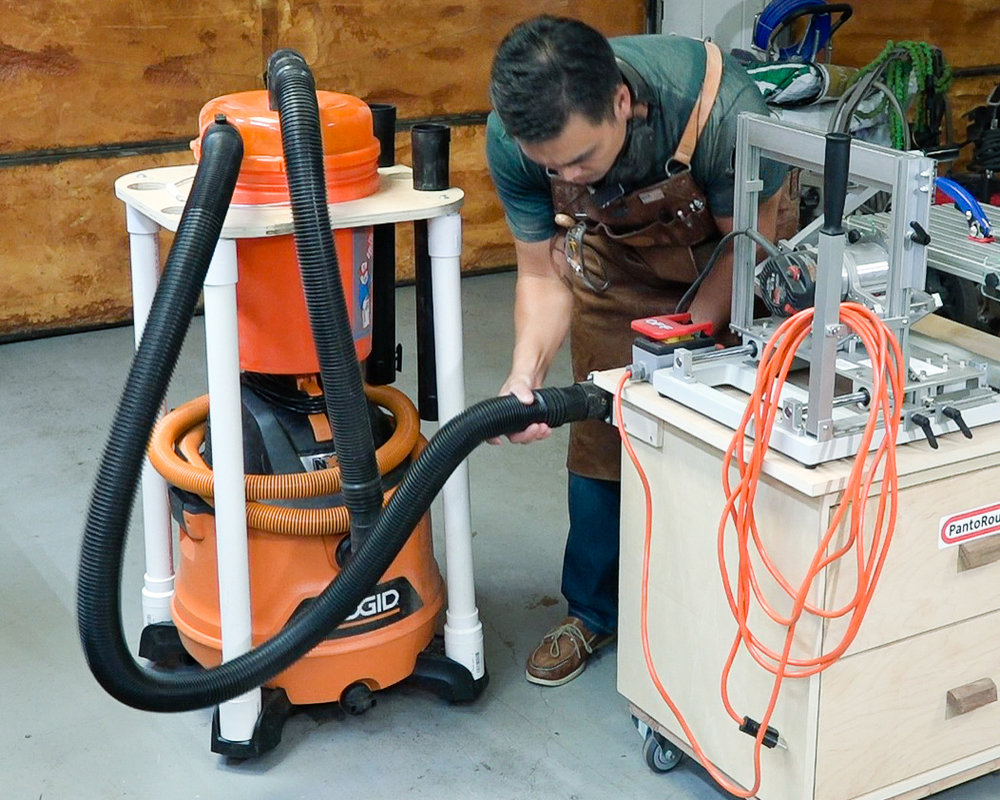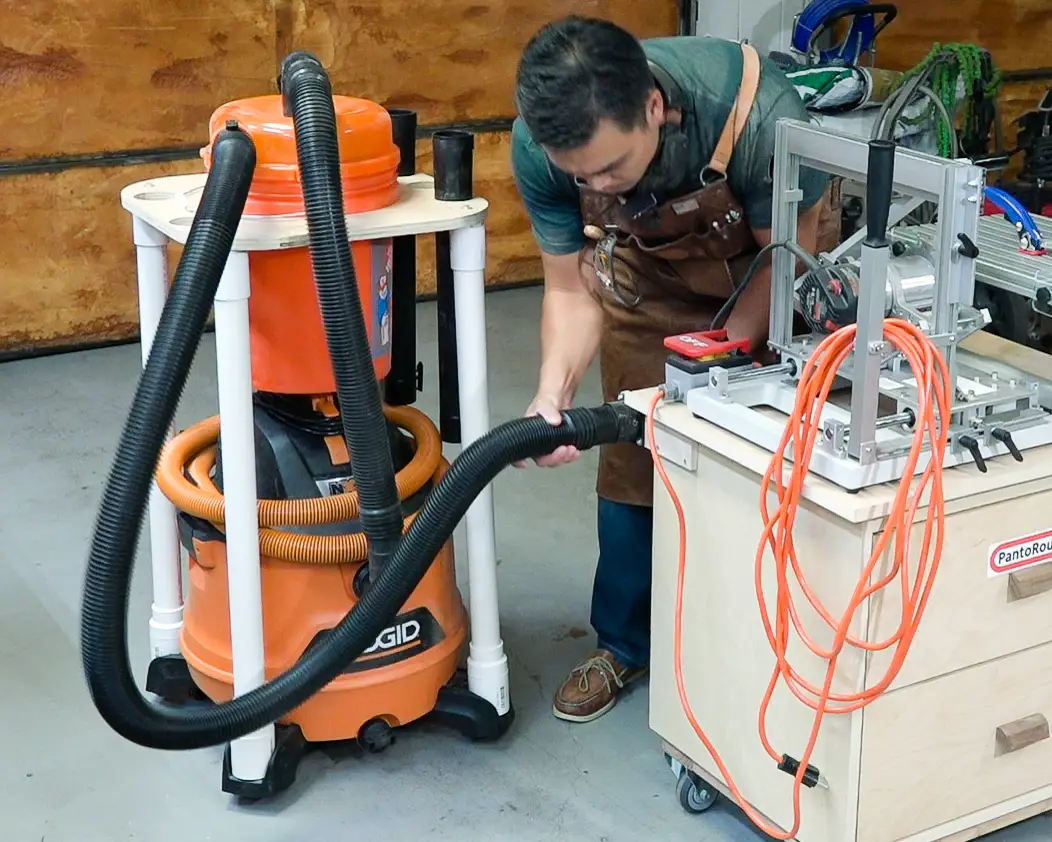Are you tired of constantly breathing in dust while cleaning your home or workshop? Have you ever wondered if a vacuum cleaner can be used for dust extraction? The answer is yes, but with some caveats. In this article, we will explore the benefits and limitations of using a vacuum cleaner for dust extraction, as well as some tips to make the process more effective. So, let’s dive in and discover how you can keep your space clean and safe with the help of your trusty vacuum cleaner.
Yes, you can use a vacuum cleaner for dust extraction. However, it is important to use a vacuum cleaner with a high-efficiency particulate air (HEPA) filter to ensure that the dust is properly captured and does not get released back into the air. Additionally, using a vacuum cleaner with a brushless motor and antistatic hose will help prevent the buildup of static electricity that can ignite dust particles.

Can I Use a Vacuum Cleaner for Dust Extraction?
If you are someone who works with wood, metal, or any other type of material that produces dust or debris, then you are likely familiar with the importance of dust extraction. Proper dust extraction ensures that you are working in a clean and safe environment, and can also help to extend the lifespan of your tools and equipment. But what if you don’t have a dedicated dust extraction system? Can you use a vacuum cleaner instead? Let’s explore this question in more detail.
What is a Vacuum Cleaner?
A vacuum cleaner is an electrical appliance that is designed to suck up dust, dirt, and other small particles from floors, carpets, and other surfaces. They work by creating a suction that pulls air and debris into a bag or canister, which can then be emptied and disposed of. Vacuum cleaners come in a variety of shapes and sizes, and can be used for a range of tasks, from cleaning your home to detailing your car.
While vacuum cleaners are not typically designed for industrial use, they can be a useful tool for DIYers and hobbyists who need to clean up small amounts of debris from their workspaces. However, it’s important to understand the limitations of using a vacuum cleaner for dust extraction.
The Limitations of Using a Vacuum Cleaner for Dust Extraction
While a vacuum cleaner can be an effective tool for cleaning up small amounts of dust and debris, it is not a replacement for a dedicated dust extraction system. Here are some of the limitations of using a vacuum cleaner for dust extraction:
Noise
Vacuum cleaners can be quite loud, especially if you are using one with a high-powered motor. This can be distracting and make it difficult to concentrate on your work.
Capacity
Most vacuum cleaners have a limited capacity, which means that you will need to stop and empty the bag or canister frequently if you are using it for dust extraction. This can be time-consuming and disrupt your workflow.
Filtration
Vacuum cleaners are not typically designed to filter out fine dust particles, which can be harmful to your health if you are exposed to them for prolonged periods of time. While some vacuum cleaners do have HEPA filters, these are not always effective at capturing all types of dust and debris.
Static Electricity
When using a vacuum cleaner for dust extraction, you may experience static electricity, which can cause dust and debris to cling to surfaces and make it difficult to clean up.
The Benefits of Using a Dedicated Dust Extraction System
While a vacuum cleaner can be a useful tool for cleaning up small amounts of dust and debris, a dedicated dust extraction system offers many benefits over using a vacuum cleaner. Here are some of the benefits of using a dedicated dust extraction system:
Efficiency
A dedicated dust extraction system is designed to be highly efficient at capturing dust and debris from your workspace, which means that you can work for longer periods of time without having to stop and clean up.
Capacity
Dedicated dust extraction systems have a much larger capacity than vacuum cleaners, which means that you can work for longer periods of time without having to stop and empty the bag or canister.
Filtration
Dedicated dust extraction systems are designed to filter out fine dust particles, which means that you are less likely to be exposed to harmful dust and debris while you work.
Static Control
Dedicated dust extraction systems are designed to minimize static electricity, which means that dust and debris are less likely to cling to surfaces and make it difficult to clean up.
The Verdict: Can You Use a Vacuum Cleaner for Dust Extraction?
In conclusion, while a vacuum cleaner can be a useful tool for cleaning up small amounts of dust and debris, it is not a replacement for a dedicated dust extraction system. If you work with materials that produce a lot of dust or debris, or if you work in a professional setting, it is highly recommended that you invest in a dedicated dust extraction system. A high-quality dust extraction system will not only help to keep your workspace clean and safe, but it will also help to extend the lifespan of your tools and equipment.
Frequently Asked Questions
Here are some common questions about using a vacuum cleaner for dust extraction.
Can I use a vacuum cleaner for dust extraction?
Yes, you can use a vacuum cleaner for dust extraction, but it depends on the type of vacuum cleaner you have. Not all vacuum cleaners are suitable for dust extraction, and using the wrong one could be dangerous. It’s important to choose a vacuum cleaner that is designed for dust extraction, with good filtration and a strong suction.
Make sure to check the manufacturer’s instructions to see if your vacuum cleaner is suitable for dust extraction. If it is, you can use it to extract dust from carpets, upholstery, and hard floors, as well as from surfaces like walls and ceilings.
What are the benefits of using a vacuum cleaner for dust extraction?
There are several benefits to using a vacuum cleaner for dust extraction. The main benefit is that it helps to improve indoor air quality by removing dust and other contaminants from the air. This can be particularly beneficial for people with allergies or respiratory problems.
Another benefit is that it can help to prolong the life of your furniture and carpets by removing dust and dirt that can cause wear and tear. It can also help to keep your home looking clean and tidy, which can be important for people who like to entertain guests or who have young children or pets.
What types of vacuum cleaners are suitable for dust extraction?
The types of vacuum cleaners that are suitable for dust extraction are those that are designed specifically for this purpose. These include industrial vacuum cleaners, HEPA vacuum cleaners, and dust extractors. These vacuum cleaners are designed to have strong suction power and effective filtration to capture and remove dust and other particles from the air.
It’s important to choose a vacuum cleaner that is appropriate for the type of dust extraction you will be doing. For example, if you will be removing large volumes of dust from a construction site, you may need an industrial vacuum cleaner. If you will be removing fine dust from a workshop, you may need a dust extractor with a HEPA filter.
Are there any safety concerns when using a vacuum cleaner for dust extraction?
Yes, there are some safety concerns when using a vacuum cleaner for dust extraction. One of the main concerns is the risk of fire or explosion if the vacuum cleaner is not designed for use in hazardous environments. Another concern is the risk of electrical shock if the vacuum cleaner is not properly grounded.
To minimize these risks, it’s important to choose a vacuum cleaner that is designed for dust extraction and to follow the manufacturer’s instructions carefully. You should also wear appropriate protective gear, such as a dust mask or respirator, when working with dust.
Can I use a vacuum cleaner for dust extraction in a commercial setting?
Yes, you can use a vacuum cleaner for dust extraction in a commercial setting, but you will need to choose a vacuum cleaner that is appropriate for the type of work you will be doing. For example, if you will be removing dust from a construction site, you will need an industrial vacuum cleaner. If you will be removing dust from a workshop, you may need a dust extractor with a HEPA filter.
It’s important to follow all relevant health and safety regulations when using a vacuum cleaner for dust extraction in a commercial setting. You may also need to provide training for your employees on how to use the vacuum cleaner safely and effectively.
This video will save you a lot of money. Dust extractors for beginners.
In conclusion, it is possible to use a vacuum cleaner for dust extraction, but it’s not always the best option. If you plan on using it for small tasks such as cleaning your home or car, a vacuum cleaner can be an effective tool. However, if you need to extract large amounts of dust or debris, it’s best to invest in a specialized dust extractor.
It’s important to note that not all vacuum cleaners are created equal. Some models may not have the power or filtration necessary for effective dust extraction. Before using a vacuum cleaner for this purpose, be sure to check the manufacturer’s recommendations and ensure that the model you have is suitable for the job.
Ultimately, the decision to use a vacuum cleaner for dust extraction will depend on your specific needs and circumstances. By considering the size of the task and the capabilities of your vacuum cleaner, you can make an informed decision and ensure that you’re using the best tool for the job.

